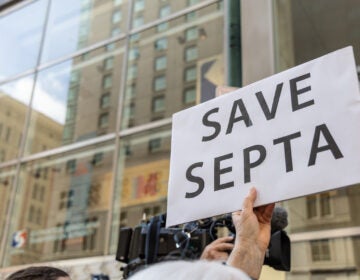SEPTA spent $7 million on McKinsey consulting contract amid COVID fiscal crisis
Nearly one year and thousands of work hours after the regional transit agency started work with McKinsey, the $7 million initiative is under review.

The Philadelphia skyline is seen from the Market Frankford platform at 63rd Street. (Emma Lee/WHYY)
Philadelphia transit agency SEPTA issued a $7 million consulting contract to global management firm McKinsey & Company during the height of the 2020 fiscal crisis ushered in by the pandemic.
The contract, according to agency officials, was intended to pay for itself by identifying millions in potential cost savings. But nearly one year and thousands of work hours later, the initiative is effectively in a holding pattern.
McKinsey, one of the world’s largest strategy consulting firms by revenue, was retained by SEPTA in October of last year.
The regional transit agency hired the company at an uncertain moment. The agency was bleeding $1 million a day driven by a nearly 90% drop in ridership and no one knew when or how relief would come.
“We didn’t really know, at that time, what kinds of federal relief would be available to us,” said Erik Johanson, SEPTA’s director of operating budgets. “Given that, and the huge amount of money that basically just evaporated from our operating budget, we went out and we decided to hire the very best consulting firm.”
Johanson said SEPTA needed fresh eyes on its operations after the pandemic’s budgetary blow.
“We basically hired them to take us through the same sort of rigorous process that any Fortune 500 company, or all of our peers, had been going through,” he said.
The project is SEPTA’s second multi-million cost-cutting consultancy contract since a $3 million effort in 2015. But the 2020 initiative, known as the “Efficiency & Accountability Transformation” project focused on deeper, systemic, cost-saving measures that would ensure SEPTA’s solvency for years to come. McKinsey produced a similar analysis for New York City’s MTA last year.
In April 2021, following months of interviews and surveys with SEPTA staff, consultants released roughly 150 recommendations that McKinsey claimed would collectively save the agency about $117 million annually once implemented. The recommendations, which ranged in size and scope, were to be implemented over a three-year timeline. McKinsey consultants identified about $48 million that could be saved through employee schedule changes or redeployment, some $22 million in procurement-related efficiencies, and another $19 million in potential savings through the sale or restructuring of agency real estate holdings.
But instead of moving ahead, SEPTA officials hit the brakes. Agency spokesperson Andrew Busch said that, in May, managers ordered accounting firm Zelenkofske Axelrod to initiate a $25,000 audit of McKinsey’s work.
“There were discussions between the general managers and Leslie’s staff and with the board chairman [Pat Deon], and other board members,” he said. “It was part of that oversight and those discussions that the audit came about.”
Tensions over change
With the recommendations still hanging in the ether and a post-pandemic recovery for SEPTA not yet on the horizon, some transportation experts raised questions about what exactly SEPTA paid for.
“There are some brand names out there that you hire because of their name,” said Jim Aloisi, a Massachusetts Institute of Technology lecturer and a former Ma. Secretary of Transportation. “McKinsey comes with a brand that enables people to feel more comfortable about spending a lot of money getting answers to questions they might be able to get in other ways.”
Among some big picture policy changes is a proposal to save millions on overtime linked to SEPTA’s costly Regional Rail service by hiring more engineers. Another recommended streamlining the agency’s procurement process to buy more materials in bulk at discounted prices. Yet another set of recommendations covered workforce digitization, such as equipping front line staff with tablets, to reduce the hours and costs associated with SEPTA’s outdated internal filing systems. Managers today sometimes manually deliver hard copies of notices and other official documents to station cashiers or clerks.
The McKinsey contract paid for the installation of McKinsey’s proprietary software program, called “Wave,” which is meant to eventually guide the implementation of its recommendations. Finally, it funded an “Organizational Health Index” – a company-wide survey of employee satisfaction.
Johanson insisted the cost savings analysis had not focused on staff cuts.
“No one is losing their jobs because of this initiative. If anything, the idea is to protect our financial future,” he said.
Aloisi said that it might be possible for SEPTA to justify the consulting expense but only if the recommendations are actually implemented.
“There’s an old expression: Be careful what you ask for,” he said. ”They asked for something and they got it, and, sometimes, the answers might require you to do difficult things.” And now they may be saying ‘Whoa, whoa, wait, we actually have to do all those things?’”
Some SEPTA staffers, speaking on the condition of anonymity, praised the McKinsey process. They suggested the audit and delay in implementation owed to some recommendations being frostily received by an “old guard” within upper management.
“They told us the chairman was concerned. Why? Because SEPTA’s own staff can’t be trusted? It’s ridiculous,” said one staffer, referring to SEPTA board chair Pat Deon. “Junior staff wanted more say in decision making.”
Johanson countered that the audit was merely a way of performing due diligence before SEPTA embarks on a radical set of reforms.
“This audit is not like a go or no-go audit. This is an audit to refine our approach and our numbers,” he said. “This is us dotting the I’s and crossing our T’s, but we’re still fully committed to implementing this transformation program.”
Johanson added that while the implementation phase of the Efficiency & Accountability project is technically on hold, SEPTA had still elected to move ahead with some “low-hanging fruit” that emerged from the consulting process. In one instance, he said, SEPTA was informed it could save on fuel costs enabling an “economy mode” feature on its fleet of hybrid buses, and had done so.
‘Room for improvement’
Yet even as SEPTA moves ahead on those smaller items, staff may have other reasons to be skeptical about the agency’s commitment to change. The organizational health index completed by McKinsey was never released in full to staff and a related diversity survey completed last year similarly remains unreleased. A brief summary of the OHI survey circulated internally said only SEPTA had scored lower on many points than peer agencies, with “lots of room for improvement.”
SEPTA also confirmed that it initiated a second $338,000 consulting process, through an existing contract with engineering firm AECOM, the same month it retained McKinsey –– and with some similar objectives. Busch said this consultancy had also focused on employee satisfaction and procedural reforms but had specifically focused on Operations, Vehicles and its troubled Engineering, Maintenance & Construction divisions –– that latter of which saw a string of former managers indicted on federal corruption charges. Busch said the AECOM project was still ongoing.
Some local passenger groups were angered SEPTA had found millions to spend on private consultants for thus far unimplemented reforms even while transit service was still operating at below pre-pandemic levels.
“I just wish they would prioritize running transit instead of hiring more consultants,” Nat Lownes, a member of the Philly Transit Riders Union’s coordinating committee.
Johanson said, in his view, that SEPTA would have little choice but to eventually proceed both with cost-saving measures and operational reforms aimed at keeping public transit viable in a post-pandemic world.
“We still have to figure out how, at the end of federal relief, we stabilize in the new normal,” he said. “The transformation is really about more than just finances.”

Subscribe to PlanPhilly
WHYY is your source for fact-based, in-depth journalism and information. As a nonprofit organization, we rely on financial support from readers like you. Please give today.









